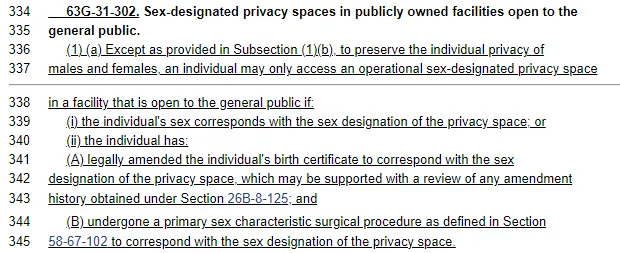
By Erin Reed | SALT LAKE CITY, Utah – On Wednesday, Utah advanced one of the most extreme anti-transgender bills in the United States. The bill, House Bill 257, would end all legal recognition for transgender individuals in the state and would enact a bathroom ban for transgender individuals of any age in many buildings.
This bill is one of several similar bills moving through state legislatures across the country, though it is one of the first to be passed out of a committee this year. It will now advance to the full House floor for further consideration.
House Bill 257, sponsored by state Representative Kera Birkeland (R-House District 4), contains several provisions that would restrict transgender individuals in public life. The first section pertains to bathrooms in any publicly funded building, including the Salt Lake City airport, convention centers, park buildings, recreational centers, buildings of public administration, colleges and universities, public schools, and more.
For transgender adults, they would be barred from these buildings unless they had an updated birth certificate and could provide proof of gender reassignment surgery. Those in violation of the law would be guilty of criminal trespass, punishable by up to six months in jail.
You can see the relevant provisions here:
When heard in committee, the bill received heavy criticism, with some witnesses pointing out that this will require all people who could be questioned in bathrooms to continually carry their birth certificates with them.
For transgender people who use the bathroom, a separate provision states that they must judge whether their presence will “likely cause affront or alarm to” another individual, essentially requiring transgender people to guess how well they “pass” to other people using the bathroom. Should they guess wrong or should somebody know their gender identity already, they could be jailed for up to six months.
These exceptions for trans people who have obtained gender reassignment surgery and an updated birth certificate, however, are rendered moot by another provision later in the bill that would make it impossible to fulfill the birth certificate requirement.
This provision essentially ends all legal recognition of transgender individuals by defining sex in a manner that excludes them from legal recognition and protections. A comparable law enacted in Kansas in 2023 led to a directive from the Attorney General, mandating the reversal of all altered birth certificates of transgender individuals to reflect their sex assigned at birth.
This law also could prohibit changes to gender markers on driver’s licenses. The proposed legislation bears similarities to recent laws in Russia and Hungary, which similarly eradicated legal recognition of transgender people.
Furthermore, multiple states are making it difficult or impossible to change one’s birth certificate. Five states currently ban birth certificate changes, and other states are considering similar legislation that would end all legal recognition for transgender individuals. Under this law, a transgender person from a state with progressive birth certificate laws, like California, could enter the restroom of their gender identity, while a person from Kansas would not be able to, even if they are identical in every other way.
Others at the committee hearing mentioned that enforcing the bill will be a nightmare. There are numerous instances where cisgender women with masculine features have been questioned in restrooms. Under the law, if someone suspects you are transgender and reports you, you might be required to present your birth certificate and potentially undergo a genital examination if under criminal investigation for being in the bathroom.
For transgender individuals who are publicly known, the options are limited; using the restroom of your assigned sex at birth could lead to questioning and investigation due to your appearance. Conversely, using the restroom matching your gender identity could result in being reported and possibly arrested if someone recognizes that you are transgender.
Should this bill pass, Utah would join Florida in becoming a “Do Not Travel” state for transgender people on the risk assessment map, a position held only by Florida after several organizations issued travel advisories warning of bathroom laws that could put them in legal jeopardy. Given that Salt Lake City airport is a common connecting flight location, this could have profound impacts on the ability of transgender people to move freely across the country.
The bill is slated for discussion and a potential vote on the House floor later today.



